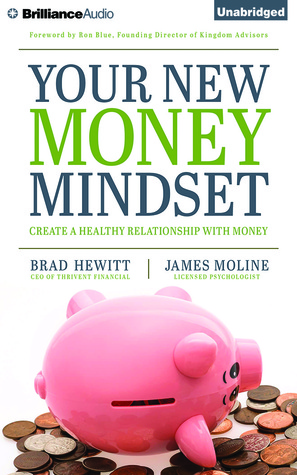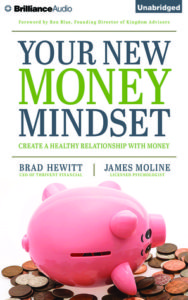A stock broker analyzes the market in order to determine which stocks to buy, to sell and to ignore. A book reviewer does much the same. As I peruse the book market, I’d like to recommend all the books, but some are simply bad buys. This reality was underscored by two books that I recently read.
Your New Money Mindset: Create a Healthy Relationship with Money, Brad Hewitt and James Moline, Tyndale House Publishers, Carol Stream, Illinois, 2015. The New Money Mindset Website is:https://www.newmoneymindset.com
I like surprises and I was very pleasantly surprised by this book Your New Money Mindset. My wife and I have struggled to raise two boys and live the American Dream on a modest income. A majority of the members of the congregations that I have served have faced the same challenges. We have wrestled with our constant desires for more, fought with credit card debt, attempted to set aside some money for retirement and give a modest amount to the church and to those in need. On the flip side of the coin the congregations that I have served have always struggled with budgets. Stewardship programs would encourage congregational members to give more and the members would respond that they couldn’t because they didn’t have any more to give.
Your New Money Mindset is the first book that I have read that offers a new, creative, practical path to dealing with money. The book goes beyond the Christian Financial Management Courses such as Dave Ramsey’s Financial Peace University and their sage advice to live within our means. The first step on the path to a new money mindset is to acknowledge the power of materialism in our lives (no matter how much we think we have or don’t have). Having begun the journey Hewitt and Moline suggest specific actions to travel further along the path.
This book is more than an easy read. It is inspirational. Hewitt and Moline never claim to be financial gurus, but rather confess that they are fellow travelers. The book has the power to be life changing. If it doesn’t start a transformation in your life, it will at least give you a glimpse of a different way to live with money and the pressure to have more. Don’t let the summer go by without reading this book!
I wish I could be as excited about this next book. Unchurching: Christianity without Churchianity, Richard Jacobson, 2016.
I really wanted to like this book. I agree with Jacobson that the institutional church has many things wrong with it. I also agree with him that small Christian fellowships, which are sometimes called organic churches, have merit. What I don’t agree with is how Jacobson makes his argument.
I must first confess that I am a part of what Jacobson is against. I am a pastor—a title Jacobson points out is used only once in the Bible. I serve a congregation in a mainline denomination. I’m a disciple of Jesus in the institutional church rather than in the organic church. Because of this you must understand that I might be a little biased.
What I take dislike the most in Jacobson’s book is the way he uses the scripture. It is called proof texting. Jacobson has a point to make, he states it and then he quotes Bible verses to support his point from all over the Bible. The verses’ original contexts and meanings are frequently not cited. The reader gets the impression that the Bible is manhandled and manipulated. Rather than listening to what the Bible has to say to us, the Bible is forced to say what he wants it to say.
My other criticism is that Jacobson takes an either/or approach to the situation. The institutional church is not what God wants. The organic church with small Christian fellowship groups is more pleasing in God’s sight. Jacobson writes that a disciple of Jesus Christ shouldn’t worship on Sunday morning with a large group of Christians and also participate in a small group fellowship sponsored by the congregation. A decision must be made to “unchurch.” There is no middle ground. Personally, I think there can be some middle ground, and in my opinion there are some inherent problems in loosely organized, lay led small groups.
Jacobson does offer the reader a large helping of food for thought. Jacobson is also passionate about this topic—this is not an abstract concept for him, but rather a personal journey. With the seismic changes that are occurring in the Church this topic is something that followers of Jesus will need to discuss with increasing frequency. I am hopeful that there are better books on the marked to introduce us to this topic. If you do want more information about the book or the organic church Jacobson’s website is: www.churching.com.
I received this book free from the author and/or publisher through the Speakeasy blogging book review network. I was not required to write a positive review. The opinions I have expressed are my own. I am disclosing this in accordance with the Federal Trade Commission’s 16 CFR, Part 244



Hi, I do believe this is a great blog. I stumbledupon it 😉 I will come back once again since i have
book-marked it. Money and freedom is the best way to change, may
you be rich and continue to guide other people.
Hi there are using WordPress for your blog platform?
I’m new to the blog world but I’m trying to get started and create
my own. Do you require any coding knowledge to make your own blog?
Any help would be really appreciated! http://cptool.com/details/?url=http://alternatif188bet.com
Yes, I’m using Word Press. No special coding knowledge is needed. It is fairly user friendly.